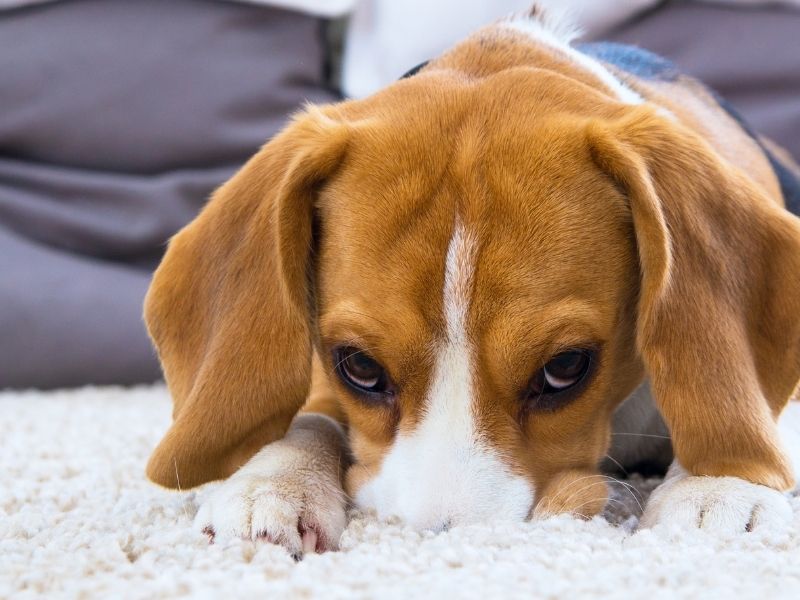
How to Stop a Dog from Marking in the House for Good
This post may include affiliate links. Please read my disclosure policy.
Urine marking is a common behavior, particularly in male dogs. Dogs mark with their urine to assert ownership of objects and areas, leaving a scent message for other dogs. Female dogs mark with their urine too, especially during their heat cycle. This natural behavior is a way for dogs to communicate and establish social hierarchy.
What’s the Difference Between Peeing and Marking?
Your dog may pee inside if they haven’t been let out enough, if they have a small bladder, or for many other reasons. But the peeing will result in a full puddle of urine.
Whereas, in marking, you’ll only find a small amount of urine, and it’s often found on the same spot or object.
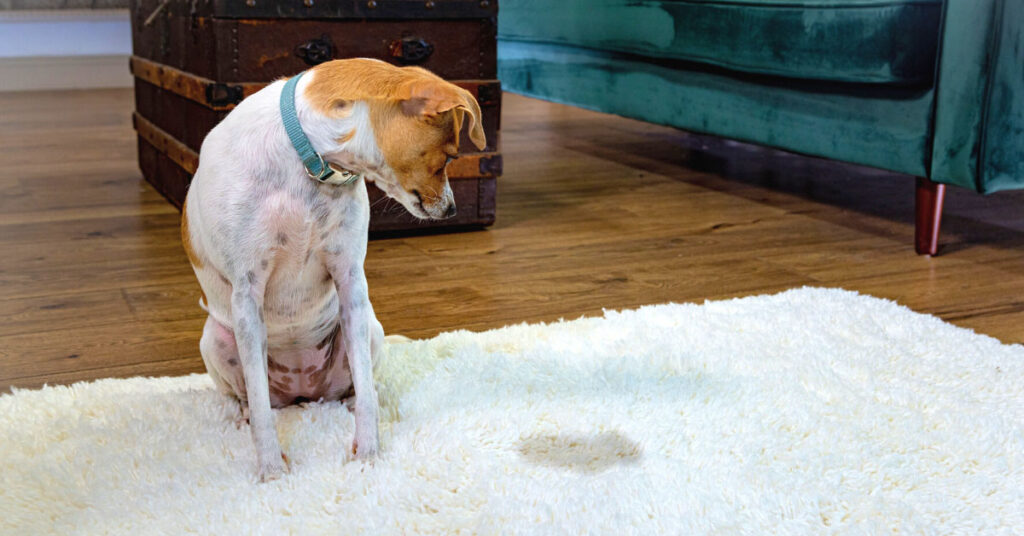
It’s considered natural behavior when dogs mark a certain spot, but it’s certainly not acceptable in the house. Furniture, floors, walls, and other items are ruined or damaged when your dog decides to claim them as his own.
Urine marking is not the result of faulty housebreaking. In fact, most of the time, urine marking can be curbed with behavior modification.
Why Is Your Dog Marking in Your House?
One of the most common reasons dogs start urine marking inside your home is the addition of anything or anyone new, be it a new dog or cat, a baby, a new partner, or even new furniture. This behavior can be particularly prevalent in multi-dog households where there’s competition for resources, attention, or status. By territory marking, a dog is basically saying, “This is my space. Keep out.”
Other triggers may be stress, like moving to a new home or even a change in your and your pup’s routine. Certain forms of anxiety, like separation anxiety, can also cause this behavior. Dogs urine mark as a coping mechanism, providing them with a sense of security and familiarity in response to perceived threats or changes.
If your dog urinates more frequently in your home, this may also indicate underlying health issues. Certain diseases may result in increased urination, which can be misconstrued as marking behavior.
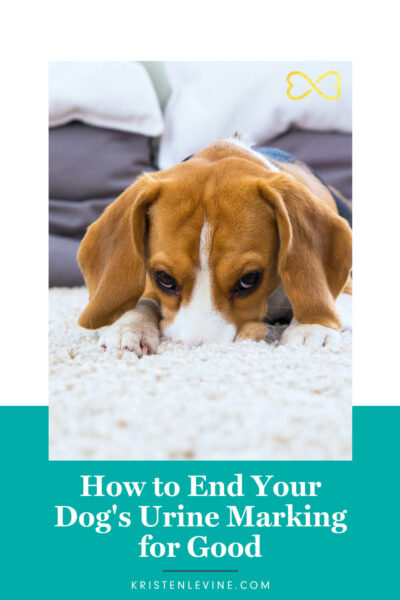
How to Stop Dog Marking in the House
Spay or Neuter Your Dog
For both female dogs and male dogs, spaying or neutering will reduce or stop marking behavior. According to the North American Veterinary Community, as many as 50% of male dogs stop scent marking, or at least do it significantly less often, after being neutered.
Intact male dogs usually begin marking when they start to reach sexual maturity.
If you have a puppy, neutering him as soon as he’s old enough is one of the best ways to stop indoor marking from starting in the first place.
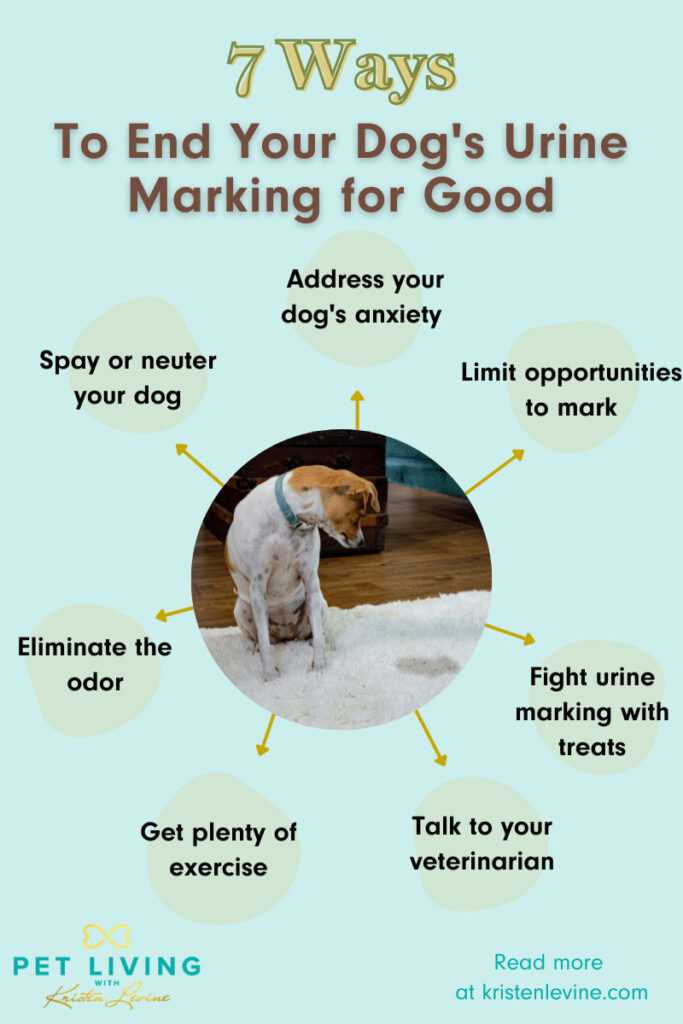
However, it may be days or even weeks for the urine marking behavior to stop after your dog is altered since hormones gradually decline rather than come to a screeching halt.
And it will likely also take some additional house training on your part to change the marking behavior if it has become a deeply ingrained habit.
If your male dog is peeing in the house weeks or months after he’s altered and after you’ve taken the steps below, there could be other behavioral or physical issues that need to be addressed.
Address Your Dog’s Anxiety
If your dog’s marking is caused by something like separation anxiety, you’ll want to address it sooner than later, especially since anxiety can escalate as your dog ages.
This is one reason why it’s important not to yell at your dog when he marks. If he’s doing it out of anxiety, yelling may make it much worse.
Some dogs experience noise anxiety, social anxiety, or separation anxiety. These fears can make a dog react with unwanted behaviors, like urine marking.
There are several OTC (over-the-counter) anxiety tools that can help alleviate your pup’s anxiety. I love this pheromone collar from Adaptil.
My dog, Chilly, had severe anxieties, especially around loud noises, and this collar was a very effective tool we used to manage it. The pheromones have a calming effect on some dogs and can reduce the urge to mark. There is also a room diffuser if you prefer that.
There are also many food-based remedies for calming anxiety, including calming probiotics and calming foods.
Ultimately, if your dog has anxiety, you may need to enlist the help of a veterinary behaviorist to work through it. You can find a behaviorist in your area using this page on the dacvb.org site.
You can also check out my pet anxiety resource page for more information about anxiety signs and solutions.
Eliminate the Odor
As long as the odor from your dog’s urine is still there, he’ll likely continue to mark the same spot. So it’s important to clean it up correctly, with a bio-enzymatic cleaner designed to eliminate biological waste, like urine. Be sure to let these completely dry to eliminate all traces of organic matter.
An enzyme cleaner works by eating the bacteria that’s causing odor and stains. Ordinary household cleaners will do little to eliminate the mess. If you’re in doubt, take a black light to any mess you’ve cleaned without using a bio-enzymatic cleaner, and you’ll be convinced!
Kinderbean No-Stress Mess Eraser is, paws-down, the best cleaner for pet mess, in my opinion. I’ve tested a lot of cleaners, and most have come up short in one way or another.
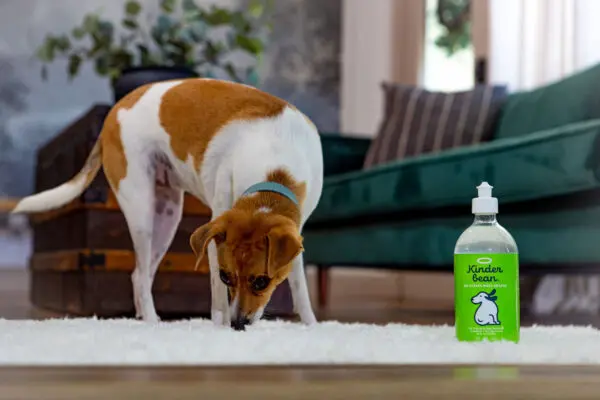
Whichever cleaner you choose, make sure it is:
- Bio-enzymatic
- Safe for pets (both in chemical composition and odor)
- Doesn’t contain harsh dyes that could discolor surfaces
- Contains natural ingredients
- Has a durable dispenser (many have cheap spray tops that break in shipping)
Once you have your cleaner, you need to use it properly to make sure it eliminates the odor.
- Soak up as much urine as possible with a paper towel.
- Saturate the spot with the cleaner. This is important so it can make contact with the urine and eat the bacteria.
- If the spot is horizontal, lay a clean cloth over the top and allow it to set overnight or 12–24 hours. If the spot is vertical, allow the cleaner to air dry.
- Retreat if necessary.
It’s a very simple process, but it’s so important not to simply “spray and wipe away.”
- Enzyme-Powered Cleaner: Simple ingredients, powered by plants. Powerful, bio-enzymatic formula biodegrades odor and stain molecules leaving nothing behind.
- Any Stain, Any Surface: Erases pee, poop, vomit, blood and scoot stains from all floor and furniture surfaces including carpets, upholstery, hard floors and more - even cleans leashes, collars and pet bedding.
- Easy to Use: In just three steps, this ready-to-use cleaning formula will erase messy stains and odors for good - no mixing, just shake and go.
- Safe for Pets & the Earth: Our non-toxic blend of safe probiotics and naturally occurring enzymes have no harsh chemicals, no scary additives, no residue and no possibility of harm to your family or pets.
- Created by a Pet Expert: Pet industry veteran and lifelong pet parent Kristen Levine created Kinderbean to make loving pets easier, messes and all.
Fight Urine Marking with Treats
Most dogs won’t pee where they eat. Change the meaning of the place he has marked by leaving treats directly on the spot after cleaning it.
Consistency is key here because as soon as you’ve banished one area as a pee spot, your dog may choose a new area. It may take weeks before your dog realizes the entire house is off-limits to territory marking. But this solution is usually permanent, so it’s worth the wait.
I like to use these treats because they’re low in calories and all-natural. When you’re dog training, you’ll go through a lot of treats, so you don’t want to give them full-size bones or cookies that will pack on unhealthy pounds.
Get Plenty of Exercise, Both in Body and Mind
Breeds known for their high energy or above-normal intelligence are in special need of exercise. Getting out that pent-up physical or mental energy can help calm your dog and avoid behavioral issues, such as marking.
If you’re already walking your dog and he’s still peeing indoors, you may need to step up your game and either walk him longer or take him for a run.
If running doesn’t get you paws-itively excited, try taking your dog to the park for a game of high-intensity fetch. One of my favorite fetch toys is the ChuckIt! Ring Chaser. It allows you to throw a ring-like toy long distances without tiring out your arm. Plus, it bounces and rolls in ways that are really enticing to our energetic pooches!
Brain stimulation is also important, so come up with creative games or tricks to teach your pet. Not only will it give your pup a purpose, it comes with the benefit of increased bonding time with you!
Exercise may seem like a very simple step, but it’s probably one of the most important!
Limit Opportunities to Mark
If your dog is a stubborn marker, you may need to take stricter measures to curb the behavior.
Some experts recommend the umbilical cord method. When your dog is inside, he’ll remain leashed to you so you can closely monitor him. As his behavior improves, you can gradually give him more freedom to explore the house.
I’ve tried this method to housebreak my dog, Tulip, and it works fantastically. I’ll caution, though, that you do need a lot of patience and consistency to see results.
When to See Your Veterinarian
In most cases, behavior modification is enough to curb your dog’s urine marking. However, in some cases, urine marking can be caused by medical issues.
Your dog may have begun marking because of a urinary tract infection, and the only way to know for sure is to visit your veterinarian.
If your dog has begun marking and there doesn’t seem to be any apparent trigger, it’s time to visit your veterinarian to rule out anything that needs treatment.
Additionally, if your dog has extreme anxiety that’s causing the urine marking, you may need to seek help from a veterinary behaviorist. They can help get your dog the relief he needs and recommend more ways and methods on how to stop a dog from marking in the house.
When Is Urine Marking Acceptable?
When you’re walking your pup, urine marking outdoors should be all right. If you’re in an area where marking would not be acceptable, perhaps like your neighbor’s beloved garden or flower bed, take note of any tell-tale signs that your dog is about to mark, like prolonged sniffing. Lead your pup away from the area by encouraging them to move along (use the voice that you know gets lots of wags) and offer treats if you have any on you.
The Tail End
If your dog is urine marking in the house, rest assured it’s not because he wasn’t house trained enough. Urine marking is a behavior, and with behavioral modification along with neutering your dog, you can stop marking for good.



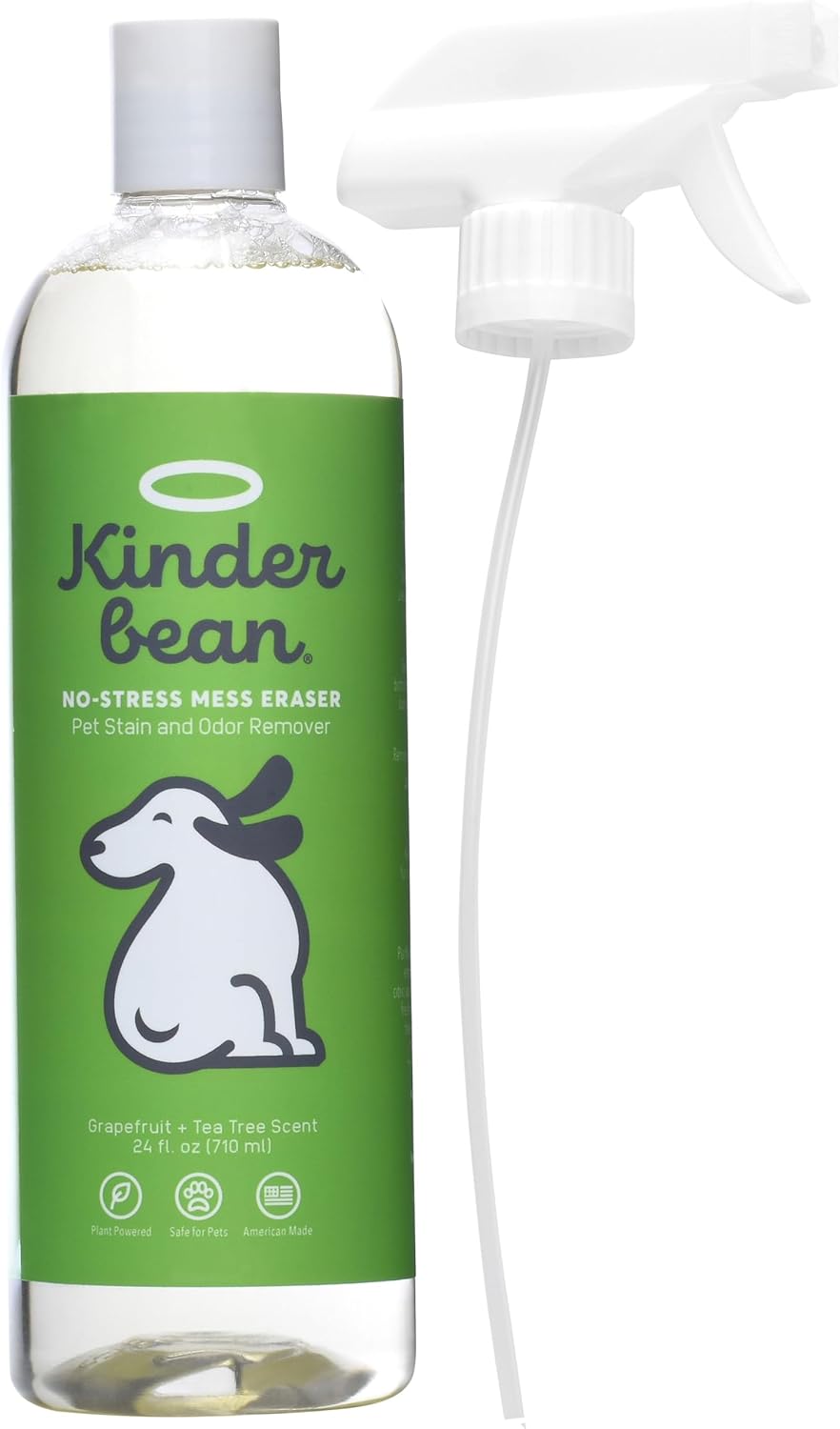

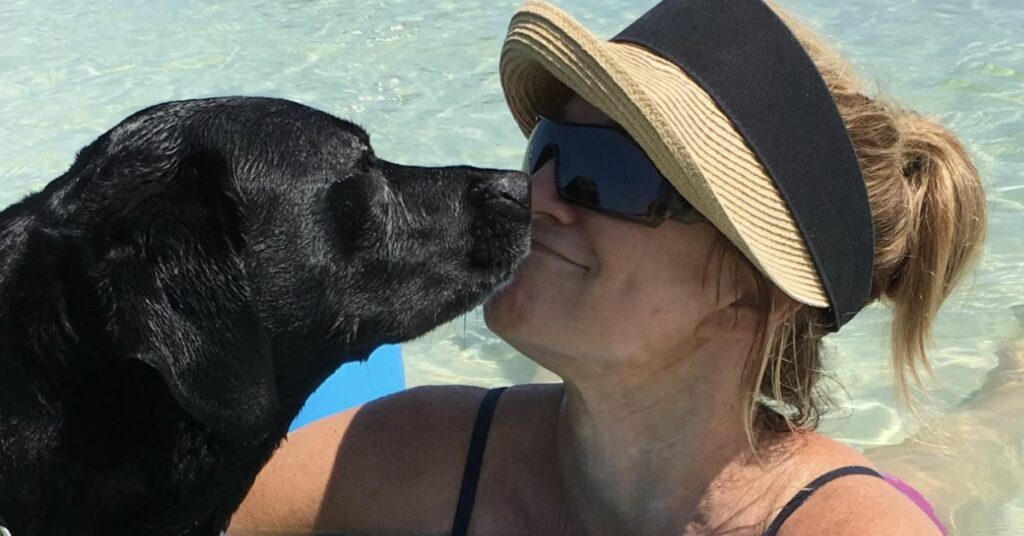
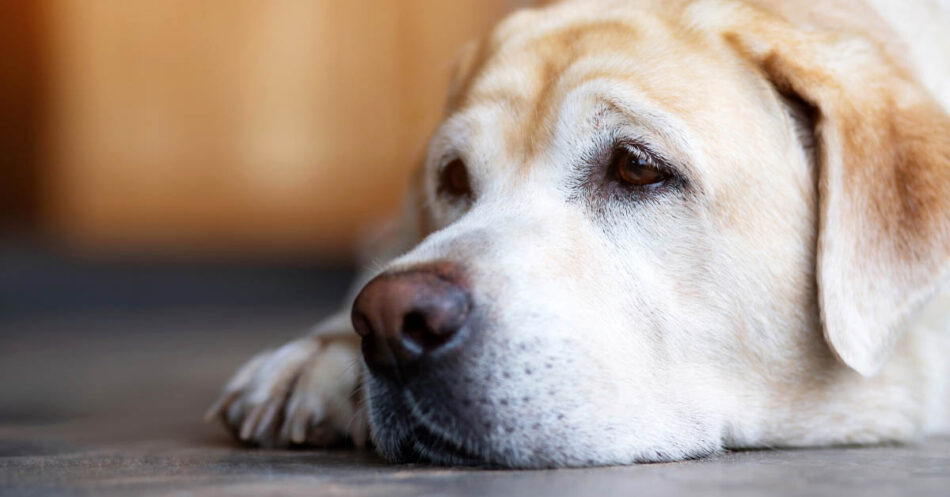
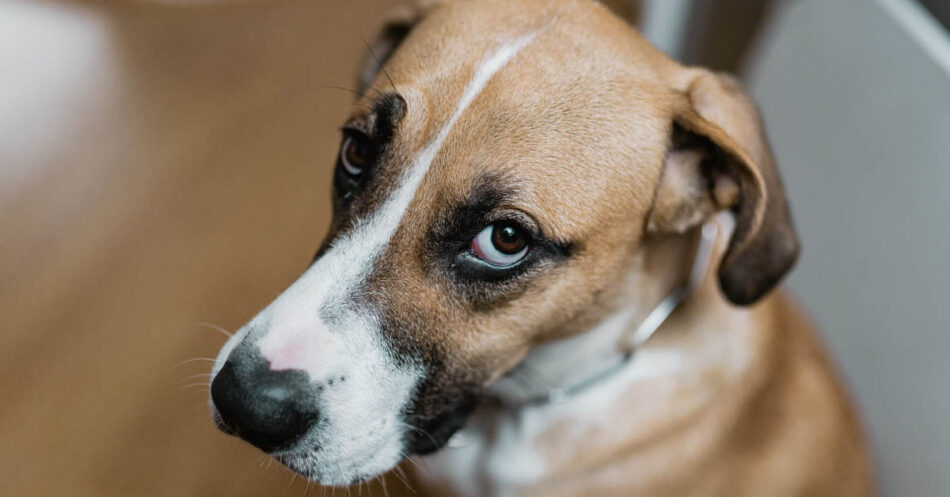

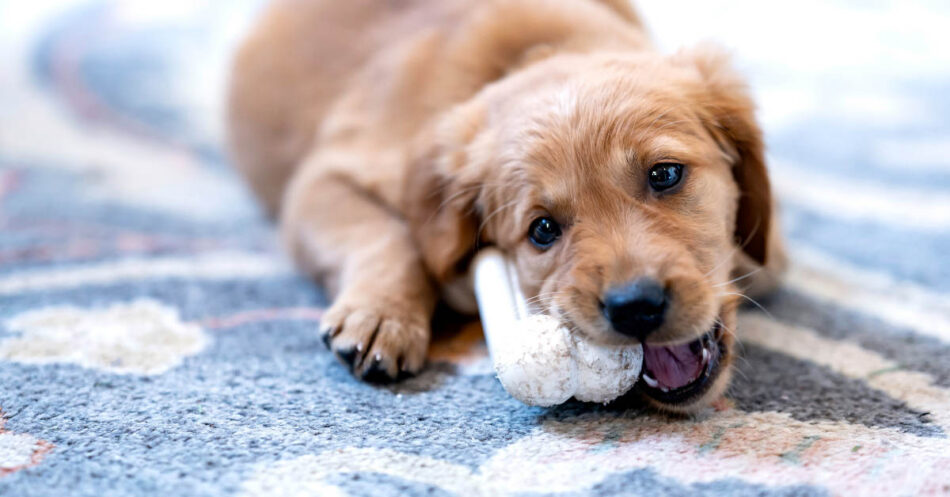
Hi there! I have 3 dogs, a 14 year old Bischon names Jack, an 8 year old Shih-Tzu named Dudlee and a 2 year old Labradoodle named Harvey. Jack, the oldest, will occasionally go potty inside but not very often. Harvey is very well trained and only goes if it’s an accident. Dudlee is naughty and marks in about 5-6 different places in my kitchen and dining room and there’s a few in the bedrooms. He has little-man syndrome and believes he’s the boss. He’s been fixed since he was about a year old. Harvey was fixed at around 4 months and Jack is not. We just finished having all of our floors refinished and new tile in the kitchen and thought the behavior would stop. Unfortunately he has gone right back to the same spots. He’s in good health but he has an attitude. We put down paper towels with Vicks on it, we’ve put food in those spots. I have used enzymatic spray and always clean it up as soon as I find it. Now that we have redone all of our floors, we don’t want them to get trashed all over again. What else can I do? My husband is less than pleased but we love our “monster-babies” big time. Any suggestions? Thank You
Oh no! I am sorry to hear that Dudlee is marking!
Is getting Jack fixed an option? I ask because it sounds like Dudlee is marking his territory around the house and since Jack is not fixed, he likely wants to prove to him that he is the “alpha male”. That is my first recommendation.
Do you notice he is marking only when you’re not at home? It could also be due to some separation anxiety. I would try to put Adaptil diffusers in each room he marks in. These release natural, calming messages for canines into the air which can make him feel more comfortable in his environment.
Finally, I would recommend taking him to the vet just to make sure he doesn’t have any underlying medical conditions. Things like UTI’s can cause him to mark more.
I hope this helps! Please keep me posted.
Kristen
Hello! I have an 8 year old, fixed, male pug who marks everything. Whenever he gets a chance, he marks. The walls, the legs of chairs, the doors, his toys, even his own bed! When he’s outside, again he marks on everything, not just on grass or trees. He’s potty trained but marks when he thinks no one is watching. He knows he’s not suppose to mark. I have tried everything. Sprays, belly wrap, taking him out every few hours. Nothing is working. Vet confirms there is nothing wrong with him, he’s very healthy. What can I do? I’m at my wits’ end!
Hi Tina,
Sorry for my delay in responding!
Hmm, that is such a frustrating situation! When did this start? Have you moved recently, had a change in routine, etc.? Any change in his life could cause stress which in turn could cause him to start marking.
Additionally, if he is experiencing anxiety, it could cause him to want to mark his territory more often. My first suggestion is to take him to a veterinary behaviorist. They are often not more expensive than a regular vet visit, and they might be able to better determine why he is marking and provide you with solutions to fix it.
Next, I would put Adaptil diffusers in every room he marks in. These release natural, calming messages for canines into the air which can make him feel more comfortable in his environment.
Additionally, clean the areas he marks in completely and really well with an Enzyme cleaner. These cleaners are experts at getting urine smell out! Even if you can’t smell it, he maybe still can. If he can still smell his urine, he is more likely to go there again! I use this and really like it.
I hope this helps! Let me know how it goes. Good luck!
Kristen
Hi, I have a 9 year d Shih Tsu who is very well behaved with a little bit of anxiety. We recently purchased travel trailer and bring her and our two jack Russell’s camping with us. She doesn’t seem nervous or afraid in the environment. We never leave them alone. But she consistently urinates on the bed ONLY in the camper, very small amounts after she’s urinated outside just before bed. She seems to do it the first night and the it stops. I clean the bedding with enzyme sprays. This is so upsetting and we need to figure out how to stop this behavior and can’t figure out the reason for it. She has recently been to the vet and is healthy and this behavior does not occur at home. If we crate her at night she screams and we can’t have that all night at a campground. We enjoy our trips with them but Are at the point of selling the camper. Any thoughts or suggestions are appreciated. Thanks.
Hi Kathleen,
I am sorry to hear that your dog is marking in your camper! That is such a frustrating issue. Were there previous owners of the camper that had a dog? It’s possible she is smelling a scent she doesn’t like and marking her territory. It’s also possible that she feels anxious in her new environment outside of the home and marks because she isn’t super familiar with the camper yet. I would recommend putting an Adaptil diffuser or bringing Adaptil spray with you and using it in the room she marks in. This is an all natural pheromone for dogs that releases “happy messages” into the air to help keep her calm.
I hope this helps! Please keep me posted.
Kristen
My situation is a little tricky. My mother-in-law moved in with us about 3 years ago and brought her 8-year old male dachshund (not neutered). I think when she lived alone with him, and even though he is house trained, she would often just let him potty inside (especially in the middle of the night). Bad habits, I know. So now that she’s living with us she seems to be more attentive to his needs, but, he likes to mark in spots. Mostly in her bedroom. He has terrible separation anxiety. If she leaves to run errands he has made it a habit to come straight back to her bedroom and pee. (Even if she let him out prior to leaving). She bought a new recliner last year and we all witnessed him go right up and hike his leg on it. My husband and I are in the process of upgrading and installing hardwood floors throughout the house. I cannot have him peeing on those floors and possibly ruining them. She (mother-in-law) gets highly offended and upset anytime we mention the dogs bad habits. So, I’m not sure if its the anxiety (when she leaves) that is triggering his behavior, or, if he is just being ‘spiteful’ (like if you leave me alone I will show you and pee on your bedskirt). He always goes to the door and barks when he’s got to go. Also, he associates a treat EVERY time he goes out and so he uses that to his advantage and will bark to go out even when he doesn’t have to pee/poop. He’s very smart for sure. … maybe too smart. But, sadly, I’m at my wits end with him!!
Hi Lisa,
Ugh! This is a frustrating situation! Is neutering him an option? I would highly recommend it. That can sometimes solve the problem all together! I would say it is safe to assume the separation anxiety is tied to the marking, but he could just keep doing it in this new house because he was allowed to do it in the old house without punishment. So, you will have to train him to not mark in your house which will be difficult! But, it’s not impossible! Have you used an enzyme cleaner each time he marks? It’s important to use one and follow the instructions exactly! This type of cleaner removes the smell completely, and if he can’t smell his urine, he is less likely to mark that spot again.
For his anxiety, I like two products. Adaptil diffusers can help release natural calming pheromones into the air to help keep him feeling calm. Just plug them in the rooms he marks in! Additionally, CBD oil or hemp oil treats can help him to feel calm. I would suggest giving him one before she leaves the house that way he is feeling less anxious before she leaves. I love The Anxious Pet hemp treats for my dogs, and they love them too! You can get them here.
I hope this helps! Keep me posted.
Kristen
My dog is 6 years old, potty trained and despite what you say…. spiteful. When he is left alone he pees on the side of a loveseat in my livingroom. It’s usually not a lot of pee just enough so that it’s seen when we get home. How do I know he’s being spiteful? Because I know my dog. When we are going to leave him for any extended period, I make sure to walk him and let him get it all out. Because when his bladder is actually full, he pees in a whole different room. He holds that pee as long as he can but when he can’t hold it any longer he may have an accident. I can’t catch him in the act to correct his behavior, and it’s been years since we have crated him. I want him to feel free roaming the house while we’re away, but I’m sick of him doing his business on our sofa. The only saving grace is that it doesn’t stink like the pee he lets off outside.
Aw, David I am so sorry your dog is marking!
This is a frustrating issue, and even more so when we feel our dog is doing it out of spite! This behavior is not uncommon in dogs who have separation anxiety. It is possible he is experiencing some separation anxiety when you leave the house causing him to mark. But, there are solutions!
Is he neutered? Neutered males are much less likely to mark their territory. It’s never too late to get that done and it can help to correct the behavior!
I would suggest putting Adaptil diffusers in the room he marks in. These release natural, calming pheromones into the air that allow for him to feel calmer while he his alone. I have used them with great success in the past! Things like DOGTV can also help to keep him company while he is alone. I leave it on for my dogs when I know I’ll be out for an extended period of time to keep them company. You can check it out here and use my code PETLIVING to get 30 days for free.
Additionally, clean the areas he marks in completely and really well with an Enzyme cleaner. These cleaners are experts at getting urine smell out! Even if you can’t smell it, he maybe still can. If he can still smell his urine, he is more likely to go there again! I use this and really like it.
I hope this helps! Keep me posted.
Kristen
Hi,
My 2 yr old male pitbull, who’s neutered, recently started marking territory in the house. We have a 1 year old male pitbull puppy. We’ve had him since he was 8 weeks old. He will be neutered next month. Will my 2 year old stop marking once the puppy is neutered?
V/r,
A friend
Hi,
It sounds like your older dog is marking his territory. Once your puppy gets neutered, keep a close eye on your 2 year old. If he continues to mark, I would take him to the vet to make sure there is no underlying medical conditions, like a UTI, that’s causing him to mark.
In the meantime, clean the areas he marks really well with an enzyme cleaner. Enzyme cleaners, when used properly, are really effective in getting out odors completely.
You can also try putting adaptil, natural calming diffusers, around the house in the rooms where he marks. Those can help him to feel more calm and comfortable in his environment, making him less likely to mark.
I hope this helps!
Kristen
I have read through all of these comments. Still want to get some side advice. This is driving me nuts. I have two Siberian huskies and a cane corso mastiff. My first Siberian my baby girl is 7. Moe moe is my second Siberian who is a male five years old. I took in my nephew Primo ( four years old) from my friend because they couldn’t give him the attention he deserved anymore after they had their child. both my Siberians are spade/neutered but my nephew still has his family jewels. There was no problem up until a month ago where my Siberian male moe, (who doesn’t have his jewels) started peeing infront of his crate and infront of Primo’s bowls. Ive had Primo (cross) for 9 months until the problem started. Now I am cleaning up Moes piss three times a day because of what I think is territory issues. It boggles my mind. They are not fed next to each other. Moe loves his crate. I never lock it. My dogs love each other and play with each other completely fine, let alone all sleep on my bed with me at night. I am so confused why all of a sudden he is starting to mark his pee around his crate. It is driving me crazy. It isn’t a let outside issue. I work from home. I keep my backdoor open for them to come and go as they please unless at night. I have tried vinegar, I have tried switching his crate to the living room from the previous location in the dining room. I am lost for answers. These sprays online do not work. what else is recommend for this help? He gets just as much attention as the other two. Thanks.
Hi Nick,
Gosh, that is frustrating! At first, yes this does sound like a territorial issue. It sounds like your older dog is wanting to show the new addition that this is “his house” so to speak. I would get your new dog neutered, as this might help. Although your marking dog is neutered, he can tell Primo is not. That could help ease the territorial tensions.
I would also suggest you talk to your vet or a veterinary behaviorist. Veterinary Behaviorists are trained in pet behavior and can help with his marking behavior. They are often not more expensive than a regular vet visit!
From the information you have given me, I would agree this sounds behavioral, but checking with your vet to ensure he doesn’t have an underlying medical condition, like a UTI, will also help to nail down the cause.
Is the spray you are using an Enzyme cleaner? Enzyme cleaners are really good at getting all of the smell out. If your marking dog is still smelling his urine in that spot, he is much more likely to mark there again. It’s important to follow the directions on the package exactly to ensure you’re getting the smell out. And, it could take a few treatments until it’s completely gone.
Hope this helps! Keep me posted.
Kristen
I have a 1 1/2 year old pup who has been potty trained for awhile now.
About 5 months a go he started peeing in the bedrooms and our bathrooms even after we deep cleaned them. So we confined him to the living room. Well all of a sudden he is peeing on our furniture (couch and TV stand). I have taken him to the vet not health issues.
Hi Jasmine,
I am sorry to hear your dog started marking! What breed his he? Some breeds (specifically small breeds) are notoriously difficult to housebreak. Since they have smaller bladders, they need to go outside more frequently. When you notice he is marking, take him right outside so he knows that is where he needs to go to the potty.
My number one recommendation is to get him neutered if he is not already. Un-neutered males are much more likely to mark their territory. Additionally, it is really important to clean the area he marks completely so that he can’t smell his urine anymore. If he can still smell it, he is more likely to keep going in that spot. I really like this cleaner: and be sure to read and follow the directions carefully!
Let me know if this helps!
Kristen
Our rescue group took in a mom and dad and we asked the guy why they were outside dogs and he said because Miss P did not get her name accidentally….she peed in the house all the time. He found them as puppies and did not know about spay/neuter and they had litter after litter and finally we found them while doing an outreach to lower income neighborhoods. They were living outside. Her partner was just adopted and he is doing great no peeing in the house but Miss P is peeing in the home of the foster mom. Both were altered a few months ago. She has been to the vet and there is nothing wrong and she is dog friendly to other dogs.
Hi Sandy,
I am sorry to hear that Miss P is still marking! Unfortunately, since she has never been housebroken before, it will be more of a challenge to get her to go outside. She likely does not understand that it is wrong to go inside the house!
Each time she pees inside, clean the area she marks completely with an enzyme cleaner (following the instructions exactly), so that she can’t smell where she peed before. The Umbilical Cord Method sounds like it could be a good option for her, too! This involves keeping your dog tied to you on a leash so that you can supervise her at all times. After a few days, you can gradually start to give her more freedom. I know it sounds like a lot of work, but experts swear by it!
Additionally, ensuring she has a predictable schedule is a must. Feeding her at the same time each day can help her (and you) to predict when she has to go potty. Then, you can both anticipate potty time and ensure she is outside for it.
I hope this helps! Keep at it. Miss P will be going pee outside before you know it 🙂
Kristen
Hi. I have a 5 year old neutered male rat terrier who only marks when we take him to friends or relatives homes. He’s a rescue whom we believe was mistreated by his former owners because he’s afraid of everything (it took 6 months for him to stop submissive urination every time I approached him) and he has severe separation anxiety. What can I do to stop this behavior?
Hi Connie,
Aw, I am so sorry to hear that he was mistreated before. Thank you so much for rescuing and taking good care of him!
This does sound like an anxiety marking issue to me, given the information provided. I would highly suggest he see a veterinary behaviorist. They are experts in vet behavior, and can help train him to feel more comfortable around people and in new environments. They can also help the separation anxiety. You can find one near you here.
In the meantime, I would call your vet to see if he could benefit from an anxiety medication since his anxiety is severe. If you aren’t as open to that, Zylkene could be worth a try! It is an anti-anxiety supplement made from dehydrated milk. It’s not a medication, so it won’t alter his personality at all! You can give this to him by sprinkling it over his food or put it on a treat before you go to someone’s house with him, or before you leave him at home alone. This can help him to feel more calm.
I hope this helps!
Kristen